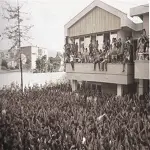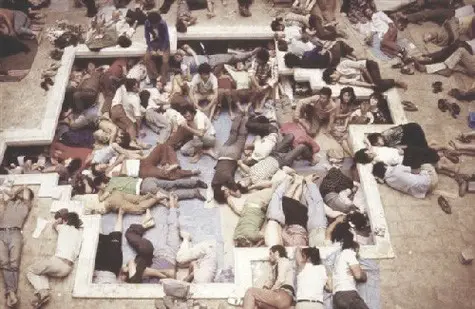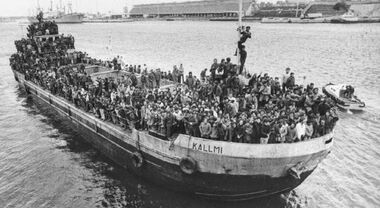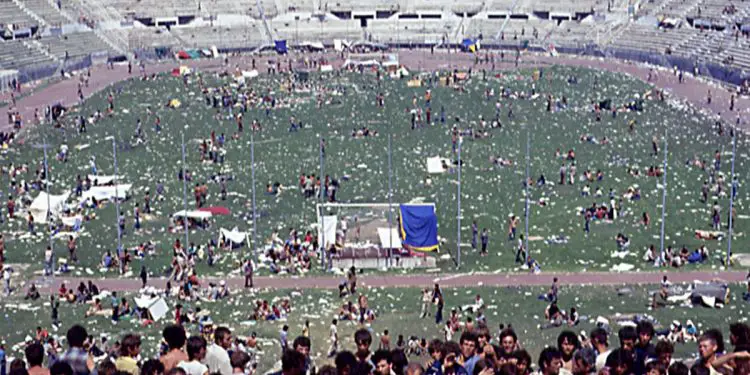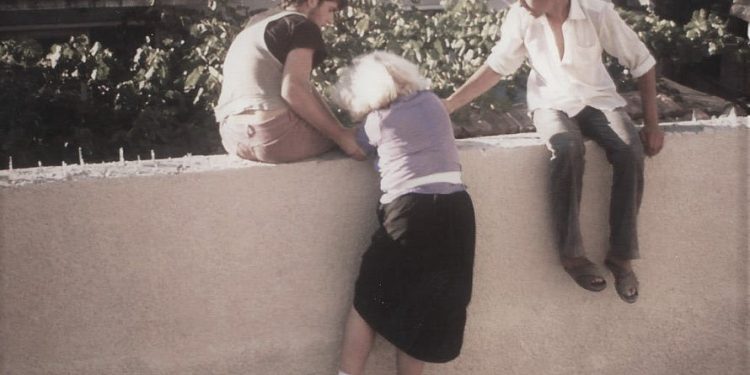“Albanians who arrived in Prague on Havel’s plane looked tired from the trip, most of them looked like they were in the early 20th century, with careless clothes.” –
Memorie.al / The Albanian refugees who left their country said today that they hope in their courage to encourage more of their fellow patriots to resist the communist hardline in Albania. But many of them admit that their escape, apparently, will bring problems for the people they left behind and some say that; “they are afraid that their relatives may face violence”.
“I think they are leaving because they are having a hard time,” says one girl, who is among the 4,500 people on board the ship bound for Italy and France. She had left on Friday, after taking shelter in one of the Western embassies in the Albanian capital.
But a woman who worked in a shoe factory, adds that; neither she nor her husband felt regret at this moment about the decision they had made to leave for the West, together with their 3-year-old son. “Our child’s future is in question. We will not let it grow here”, says the woman.
The first day of freedom
For more than 800 Albanians stationed in Italy, this is the first day of freedom, walking behind the closed bars of a half-destroyed military warehouse outside the Adriatic port.
Conditions were reported to be the same for the other 3,100. who had found shelter in the West German Embassy and in train cars, which would later depart for their destination in Germany.
The French Foreign Minister said that a ship carrying about 550 Albanians will dock in Marseille on Sunday. “The ship was scheduled to arrive today, but it cut short the trip after a pregnant woman fell ill and was sent to Italy,” says the France-Presse news agency.
A plane carrying 56 Albanians arrived in Warsaw today, while 39 others flew from Tirana to Budapest. The Associated Press reported that more than five Albanians traveled from Budapest to the Bulgarian capital, Sofia.
Grim realities
After the data had been taken on all those who had fled in revolt against the Stalinist government, in the only country left in Eastern Europe, the Albanians who had been transported to Italy, woke up in the morning all in line, where it was read on their faces a grim reality, of a new life.
Concern about the danger to their cousins in Albania was present in their refusal to give their true identity. Their hesitation on Friday was the least of it.
Concerns increased when some told stories of shootings and beatings of people who were with them in futile attempts to climb up and enter the embassies.
Of the new arrivals, there were more and more sick people today, and two groups of them had been to the hospital to receive medical help. They were treated with medicine for their illnesses and injuries.
The prefect of Brindiz says that; “It is certain that the refugees must have stayed in the camp, more than the days that were planned. Some are in difficult conditions than they were in the beginning”.
Also, the Italian Red Cross announced that a new center, which will serve more than 300 people, is opening soon and will offer specialized service and medical treatment.
The Albanians had been well fed for the first time, although they had feasted on fresh beef and canned pasta for lunch, which were distributed in baskets on the army boat. But they continued to be unwashed and unshaven because there was a problem with the water.
And since they withheld details about their identities to the military officials tasked with registering them, it made it clear that getting to the top of the job was messy and lengthy. Most of them were young and there was a mixture in their well-educated, which was poor in writing and pronunciation.
Almost everyone said that the ultimate goal was to go to the United States of America, Canada, or Australia. But workers or intellectuals, among whom there were acquaintances, were not ready to make a leap from their small world, to integrate into modern life, since it was a peasant, violent and obsessive society from the inside.
However, they are willing to make the journey. A man by profession, a mechanic, says he wants to live in Italy, but his goal is to reach the United States. “This does not mean that he does not like Italians, but that he wants to go as far away from Albania as possible”.
To look at the West
Like the others, he, most of the time, wanders around the warehouse yard. Many others have gathered to receive shoes, pants, T-shirts and underwear that the soldiers were handing out, while still others were huddled in front of a large TV screen watching a Western movie.
Mr. Mazzitello says their main requests were cigarettes, postage stamps for the letters they were going to send, phone cards to contact their people back home. A young man, who had managed to contact a friend in Tirana, said that “the city was calm and that the Western embassies were closed for cleaning”.
A man, who had made a phone call to Tirana, said that a friend of his had told him that; “the old people had a bad opinion of us who left, while the young people shouted: Good luck, good luck”!
How the 51 Albanians of the embassies traveled, with Havel’s plane
“All 51 Albanians who sought asylum at the Czech Embassy in Tirana, in the Albanian capital, traveled to Prague early in the morning, as they are guaranteed political asylum”, – said official sources here and in Tirana.
The 51 people are part of the 6,000 Albanians who gathered and entered by breaking the doors of the embassies in Tirana in recent weeks to escape from the last Stalinist government in Eastern Europe. Travel with Havel’s plane
Officials of the Foreign Ministry of Czechoslovakia said late Monday that the 51 Albanians from the embassy in Tirana were provided with passports and were allowed to leave the country. Albania has promised that all those who are now in foreign embassies will be given passports.
The Prague government sent a Tupolev-154 plane, used by President Vaclav Havel, to pick up all the refugees, 49 men and 2 women.
“Czechoslovakia’s Deputy Foreign Minister, Vojtech Wagner, said that clothes and some money were provided for the immigrants,” the state news agency reported.
After arriving here, the Albanians looked tired from the plane ride. Most of them looked like they were in the early 20th century, with casual clothes like short-sleeved shirts or blouses. The first man to get off the plane was holding a picture of President Havel.
The Albanians refused to answer the journalists’ questions. They were placed in a bus provided by the government, which would orient them to the ordered place to be accommodated. Mr. Wagner said that most of them will not stay long.
“What will happen later, I can’t say anything, because with the exception of two of them, everyone wants to go somewhere else”, – an agency quoted him as saying. The majority of Albanians have expressed their desire to go to Australia, the United States or other Western European countries.
(“In Washington, the spokesman for the US Department of State, Richard Boucher, said that he had no information about requests to travel to the US and no comments from American policy, if there will be such requests”, – reported “The Associated Press”. There is no United States Embassy in Tirana).
They sought asylum. Some had dodged police bullets and sought shelter since June 28. Albanian authorities promised on Saturday that they would issue travel permits.
The wind of change
The Albanian communist leader, Ramiz Alia, has started this year to make some prudent economic changes in an effort to improve and raise living standards, creating facilities for workers and farmers.
For 45 years in a row, travel outside Albania has been virtually impossible. But, the Albanian leaders have started to extend the ties abroad since 1985 and they have recently started to implement the reforms.
A package of new rules, which came into effect last Tuesday, gives the state the right to issue passports to anyone over the age of 16. About 3,000 people who sought asylum were stationed at the West German Embassy in Tirana.
Hanns Schumacher, the spokesman of the Foreign Ministry of West Germany, said in Bonn that a United Nations envoy had appeared at the embassies of Albania in West Germany, Italy, France and Greece, to hold talks with the Albanian government.
In conclusion, all Albanians were taken to the embassies of Czechoslovakia, West Germany, Hungary and France, while around 1000 are in the Italian Embassy and 30 others in the Greek Embassy.
Western officials have expressed their displeasure that the Albanian authorities have not provided them with permission to travel and have not guaranteed the minimum needs for the care of the refugees.
But the embassy is overflowing with migrants sleeping in corridors and in the garden, in conditions described by diplomats as highly scandalous.
The French Foreign Minister in Paris said that the procedures for providing passports for the 550 immigrants in its embassy in Tirana are proceeding rapidly. He says that “we hope that they will be completed by the end of the day”. Memorie.al
The writings were published in the New York Times on July 10 and 15, 1990
The titles are editorial
Prepared for publication, Albert Gjoka
The article was published on July 10, 1990
The title is editorial




